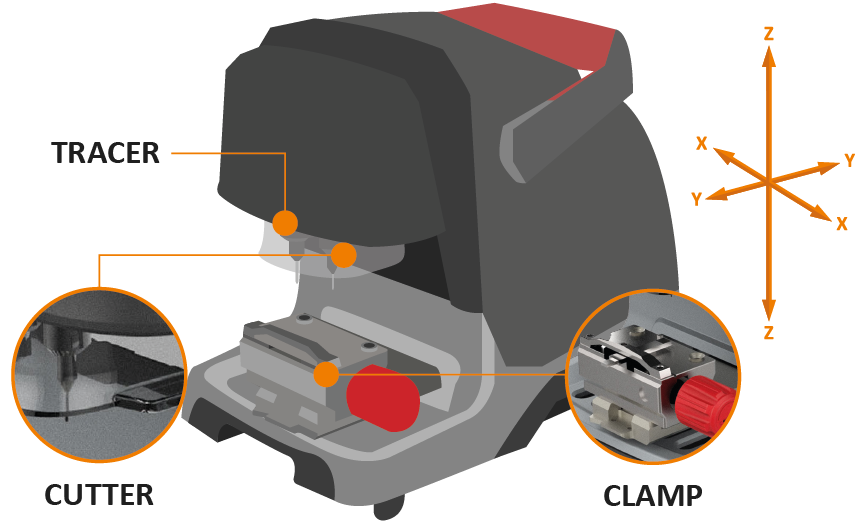"IF YOU WANT TO GUARANTEE THE QUALITY OF YOUR KEY-CUTTING EQUIPMENT, YOU'LL NEED TO CALIBRATE THEM REGULARLY. FOR AUTO LOCKSMITHS WORKING WITH KEY CUTTING TECHNOLOGY, SYSTEMS MUST DELIVER CONSISTENT CUTTING AND TRACING RESULTS WITHOUT ERRORS."
Effective machine calibration should be viewed as the foundation of machine maintenance. It's the first step to producing reliable customer results and assuring device performance; this is the reason auto locksmiths should be paying closer attention.
Calibration is used to establish a reference point that assists instruments in producing accurate results. All instruments of measurement, whatever they measure, require calibration. Take, for example, your kitchen scales at home; these should be calibrated too, without calibration; we cannot guarantee that the results given will be accurate. Which could result in significant problems for not only you but also for your end-user.
WHY SHOULD I RECALIBRATE MY KEY MACHINE?
The accuracy of measuring devices such as key-cutting machines can degrade over time; this is typically caused by normal wear and tear. However, changes in accuracy can also be caused by electric or mechanical shock or a hazardous manufacturing environment such as one containing oils, metal shavings etc. Therefore, depending on the type of key-cutting machine and the environment in which it is being used, it may degrade quickly or over a longer period of time.
Devices such as the Dolphin, which many mobile auto locksmiths use in their vans, could require recalibrating more often. Due to the movement of the vehicle, the key-cutting machine may experience changes in its calibration.
Without proper calibration, a key blank could potentially not be cut to the required specifications, causing a key that will not fit in the lock or function correctly in the ignition. Spending five minutes recalibrating your key-cutting machine could save you the time and cost of having to recut a customer's key.
The bottom line is that calibration improves the accuracy of the device, and accurate measuring enhances the quality of the product.
As there are three-axis for key cutting and tracing (as shown below in the diagram), all three axis must be calibrated accurately, resulting in a key that is not cut to specification. Without proper calibration, key bittings will not be cut accurately, resulting in a faulty product that may need to be remade.

DO YOU SEE MACHINE CALIBRATION AS A VITAL FIRST STEP IN PRODUCING ACCURATE AND RELIABLE RESULTS? OR JUST ONE MORE JOB IN THE DAILY ROUTINE?
WHEN SHOULD YOU CALIBRATE YOUR KEY-CUTTING MACHINE?
Auto locksmiths should calibrate a key-cutting machine:
- According to the recommendation of the manufacturer.
- After any mechanical or electrical shock.
- Periodically (annually, quarterly, monthly)
At 3D Group, we recalibrate our key-cutting machines daily to ensure correct key-cutting.
MACHINE CALIBRATION CAN HELP TO REDUCE COSTS.
Manufacturing keys can become a costly experience if defects occur, for example, minor measurement errors when tracing a key. When these errors occur, you must stop the process, source new materials, and restart, causing you and your customer delays.
This is expensive in both time and resources or worse yet, defective parts could be delivered to your client.
WHAT ABOUT THE UNMEASURABLE COST?
We all know that word of mouth is king; maintaining customer satisfaction and rapport is crucial to business success. Unfortunately, these errors when cutting keys cause less than desirable feedback to be left about your service. Keeping your machinery up to scratch with proper calibration will help keep these errors from happening and provide your customer with a service they will be happy with.
HOW DOES THE PROCESS DIFFER FOR DIFFERENT KEY MACHINES?
Do you work with a manual or automatic machine? A manual key-cutting machine requires regular calibration, possibly every 1 to 2 weeks because they rely on human calculation, such as the XHORSE DOLPHIN KEY CUTTING MACHINE (XP-005), which you can find here.
Whereas newer, automatic machines such as the Gymkana Condor will only need calibration when the cutter or tracer has been changed.
Looking for a new key-cutting machine? Maybe one that requires less regular calibration; check out our specialist top 3 picks below:

